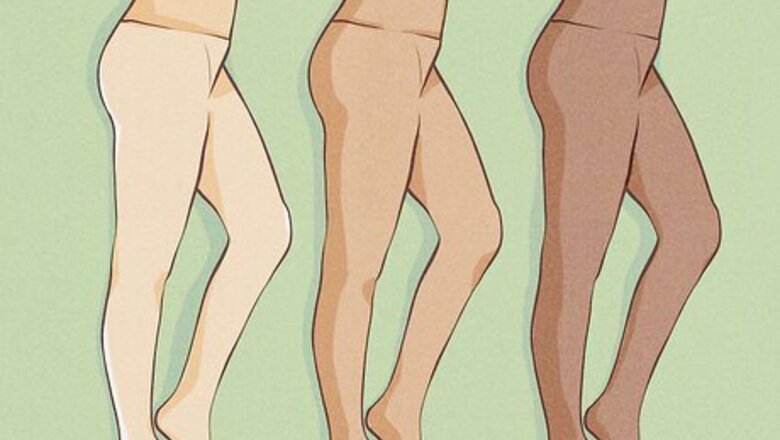
views
- Match nude tights and stocking as closely to your skin tone as possible, and opt for matte tights to avoid that glossy mannequin look.
- Match neutral tights or stockings to the hemline of your skirt or dress. Black tights lengthen and slim legs, but white tights look childish.
- Wear bold-colored tights with more subdued outfits, and subtler colors of tights with “louder” outfits” to balance them.
Choosing and Wearing Neutral Colors
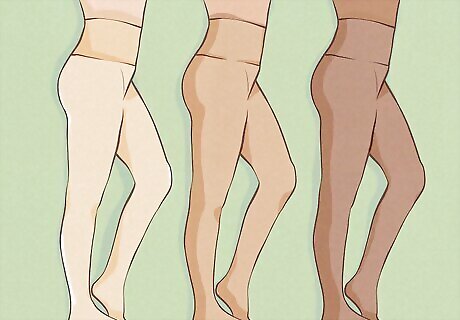
Match nude tights to your skin tone, as closely as possible. Nude is a great, versatile option, but it tends to look best when matched to your skin tone. And just because the package says "skin tone" or "natural," does not necessarily mean that it will match your skin tone. Try to buy these in person, and hold the packaging up to your legs to compare. For example, if you have very pale skin, you don't want something that is tanned or dark; it will look fake against your complexion. Instead, you could try ivory or something labeled "fair." Also, matte tights tend to look best, and work with most outfits, while shiny tights tend to give you that glossy mannequin look—which can work if you’re trying to showcase your legs.

Match your tights or stockings to the hemline of your skirt or dress. For example, if you have a black dress, then choose a pair of black tights or stockings. This helps them “support” the outfit, rather than take the main stage. There is an exception to this rule, however; if your outfit is darker than the shoes you’re wearing, go for nude-colored tights or stockings instead. This hides or “breaks” the contrast between the two.
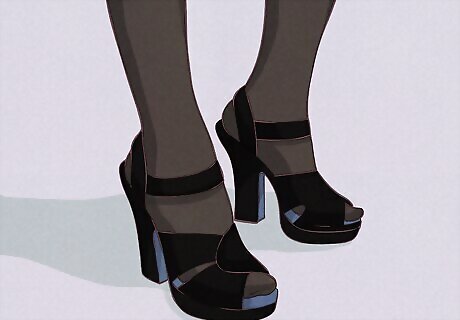
Match your tights or stockings to your shoes to elongate your legs. This creates the illusion that your legs just keep going! This effect is best achieved with black shoes and stockings, but other colors work, too. Your stockings can be a little lighter than your shoes, within reason, but avoid dark stockings with light shoes, which clash and make your legs look shorter. If your shoes are darker than the skirt or dress you are wearing, then wear stockings that match your skin color instead. If you are wearing open-toed shoes, go sheer and nude-colored. It would be best to skip tights or stockings altogether, however. Avoid wearing black tights with brightly-colored shoes. The contrast is stark and often cartoonish. It will also make your legs look shorter and chunkier than they actually are.
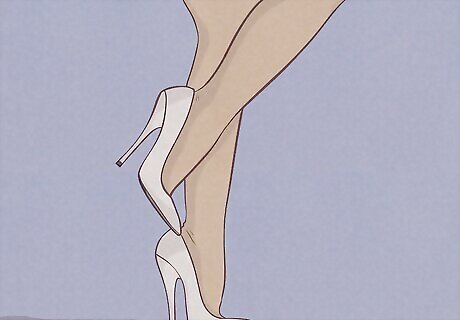
Go for sheer tights or stockings if both your outfit and shoes are light. And of course, match them as closely as possible to your own skin color. In these cases, your outfit and shoes are already making lots of “noise,” so your tights should be quieter and more invisible so the ensemble doesn’t become “too much.” The material should match your skin tone. If you go too dark, the color will look fake, instead of "sun-kissed" or "tanned."
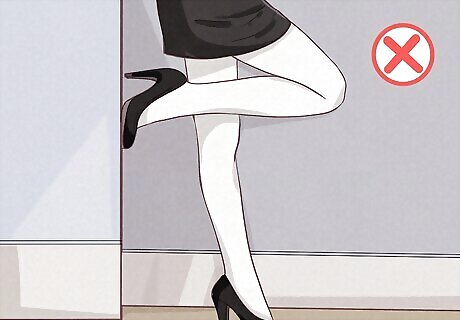
Think twice before you reach for white tights or stockings. We won’t tell you you can’t do something, but white hosiery, especially opaque white, tends to lend a certain childish or even Victorian quality, which probably isn’t your vibe. And sheer white needs to be matched just right to very fair skin, or else the stocking clashes with your skin color itself. If you have very fair skin, most "nude" colored tights and stockings might be too dark for you. In this case, sheer ivory or sheer off-white might be light enough for you.

Wear fishnets for a bolder, more interesting look. Wearing fishnets is a bit more of a risk, but one that can really pay off. Styling service founder Tannya Bernadette says a nude fishnet goes great with blush-toned skirts, and black fishnets can be worn with distressed denim shorts for a more casual, edgy look. Otherwise, treat fishnets like any other neutral tights or stockings: Match your skin tone; blacks go great with blacks; white is taboo.
Choosing and Wearing Fun Colors
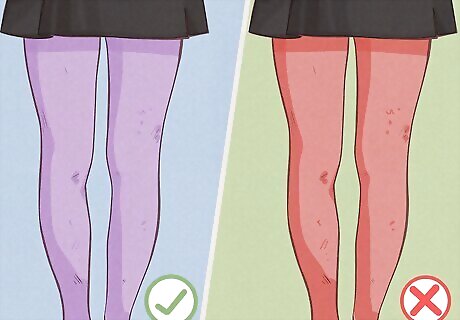
Choose darker, richer colors to make your legs look longer. Darker colors draw less attention, which generally has a slimming effect. These include colors like eggplant, burgundy, navy, and hunter green. You may want to avoid bright colors, like purple, red, blue, and green, which draw attention and make people scrutinize your legs. Opaque stockings or tights tend to have an even greater slimming effect, versus sheer.
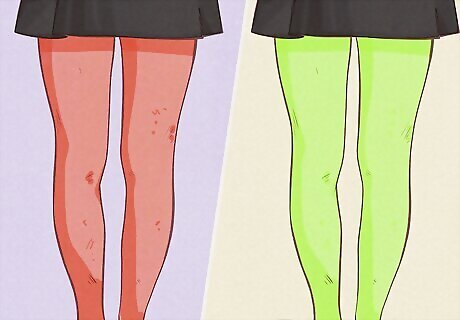
Choose bright colors if you want to make a statement. Professional stylist Susan Kim suggests pairing loud tights with a more subdued outfit, and vice versa. She says, “If you don’t want the focal point of your outfit to be your colorful tights, then I wouldn’t wear them. But if you want to show them off, I would go with a more subtle dress or skirt to show your tights off and ensure your outfit wouldn’t be too overwhelming.” Bright colors don't necessarily have to be hot pink and neon green. They can be red, blue, and green. Consider opaque tights and stockings for this; they'll work better with dark-colored shoes than sheers. This will help blend your legs into your shoes and make them appear longer.
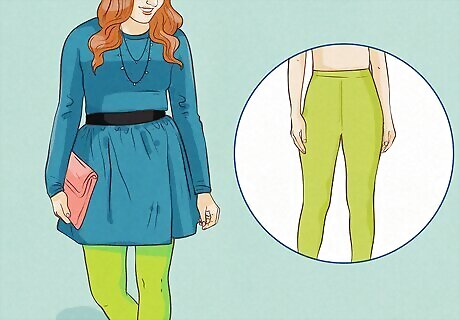
Pair warm colors with cool for more harmony. Warm colors lean toward reds and yellows, while cool lean toward blues and greens. Wearing warm tights with a cool outfit (and vice versa) adds a good amount of balance to an otherwise colorful or busy outfit. Remember that even “cool” colors like green can have warm undertones! It’s these undertones that matter. For example, if you have a dark blue (cool) dress, you might pair it with yellow-hued green (warmer) tights.
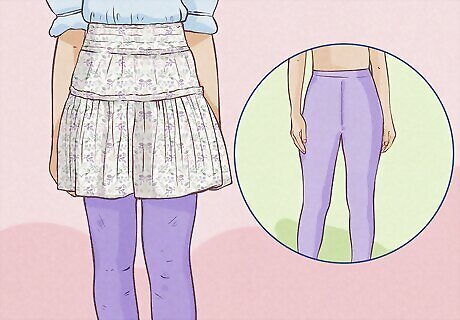
Match solid-colored tights to the print in your outfit. If your outfit has a colorful print, choose a pair of tights that match that color to balance the two. The colors will match your outfit and bring it together, but they will be dark enough so that they don't detract from your outfit. For example, if you’re wearing an ivory skirt with a purple, green, and brown pattern on it, you might wear plum, dark-green, or brown tights.
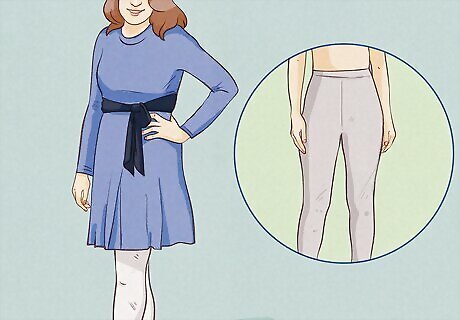
Make colored tights accent a hemline, not match. Wearing tights in the same color as your hemline threatens to make your whole outfit blend together too much. Instead, make your tights accent your hemline by choosing a similar, lighter, or complementary color. For example, if you wear a dark blue dress with dark blue tights, your outfit becomes blocky or monotonous. Instead, try a dark blue dress with gray or brown tights. Remember: bold outfit colors call for subdued tights, and bold tights call for subdued outfit colors.
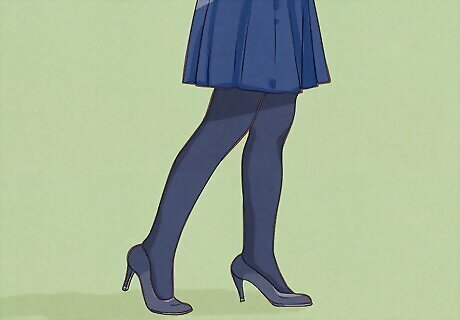
Match colored tights and shoes loosely, not exactly. The “rules” for shoe and tight colors are different for colored tights than neutral tights. Matching your tights to your shoes in this case will bring in too much of the same color, and make your outfit look less unique. Instead, go for a similar but lighter color to bring some variety and interest. On the other hand, avoid creating too much contrast between your tights and shoes. Light blue tights and black shoes will make your legs look short. Dark blue tights and black shoes will make your legs look longer.
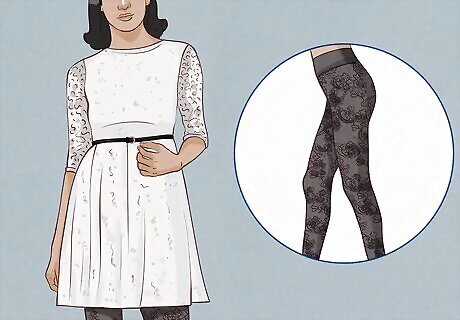
Have fun with patterned tights, but mind your outfit’s balance. Professional stylist Susan Kim says go for the patterned tights, but only with more subdued or solid-colored outfits. Otherwise, your ensemble risks being too busy. For example, a pair of lacey black tights would look cute with an ivory, fit-and-flare dress and a thin, black belt. Also, beware wearing multiple different patterns, which can lead to a headache-inducing look. Unless that’s your intent, in which case, do your thing!
Following General Fashion Advice
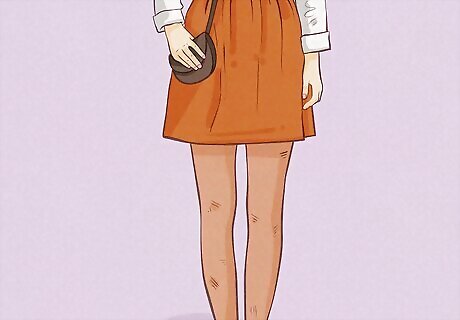
Choose colors based on the dominant colors in your wardrobe. Take a look at your closet, and see what is the dominant color among your skirts and dresses. Next, buy some tights or stockings that match those colors. This will make creating outfits easier in the future. And when in doubt, monochrome looks are all the rage. For example, if you have mostly gray or brown skirts and dresses, choose tights or stockings in those colors. If you’re stuck, try finding your color season, or a set of colors that works best for your skin tone.
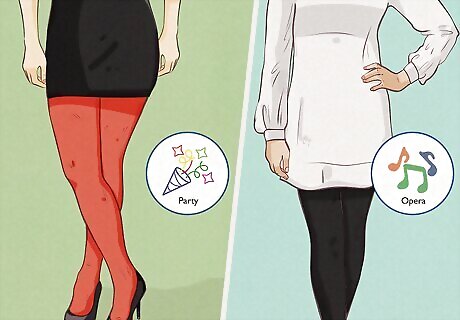
Pair colors with the appropriate occasions. Certain colors just go better with certain occasions and locations than others. For example, bright red tights might not look very professional in an office-type setting, but they'd work great for a party or concert. On the other hand, black might be too severe for a casual picnic in the park, but they'd be appropriate for a grand evening at the opera. Nude-colored tights and stockings are suitable for most all occasions. Just remember to choose a color that matches your skin tone.

Wear colors that are appropriate for the season. There are no rules as to what you should and should not wear, but dark colors tend to vibe better when it's cold, and light colors tend to match a warmer temperature. Plus, dark colors absorb more heat, which makes them less comfortable in hot weather. In fact, you might want to skip wearing tights or stockings during the warmer months altogether! If you do choose or need to wear tights or stockings during the warmer months, choose something that is lighter in color, or something that is close to your skin tone.
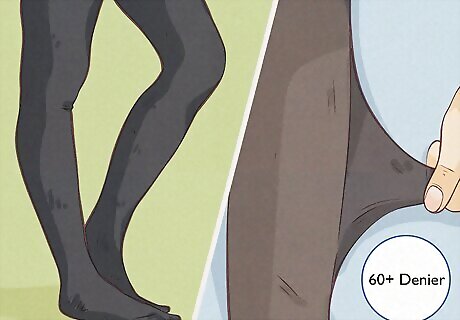
Pick a denier that complements the look, or based on season. The “denier” is an indicator of how sheer tights or stockings are. Thicker stockings with higher denier (like 60 and up) are more opaque, and lower deniers are more see-through. Generally, sheerer tights are more understated and work well with louder colors or lightweight outfit fabrics. More opaque tights draw more attention but work well with more subtle outfit colors, or heavier outfit materials. Also, a higher denier is generally warmer and thicker, so go high in the cool seasons and low in the warm.



















Comments
0 comment